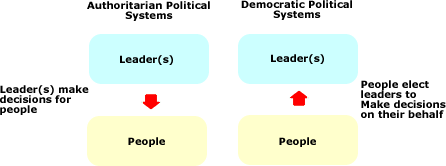Lesson 2: The Will of the People
| Site: | MoodleHUB.ca 🍁 |
| Course: | Social 30-2 RVS |
| Book: | Lesson 2: The Will of the People |
| Printed by: | Guest user |
| Date: | Wednesday, 31 December 2025, 11:30 PM |
1. Introduction
The Will of the People
Issue Question: Are the values of liberalism viable?
Duration: 2 blocks (80 mins each + homework)
Governments exist because people need an institution to organize society. You learned this all the way back in unit one when you watched the young boys attempt to organize themselves after being stranded on an island in The Lord of the Flies. In a democracy, governments are expected to organize society according to the wishes of the people. The notion that democratic governments are made of the people, by the people, and for the people has become an important value associated with liberalism and democracy. The big question is how do governments know what the will of the people is???
2
2. Lesson5.2.1 The Will of the People
Democratic Liberalism and the Political Spectrum
Begin your examination of democratic liberalism by looking at the entire political spectrum. Because you will be learning more about democracy, you should now have a closer look at the political spectrum. This spectrum shows how political systems can differ in the amount of power held by the government and by the people.
How does the democratic political system fit into the political spectrum? Examine the following political spectrum carefully.

The political spectrum is a continuum that allows comparison of governments in various countries. The amount of government control a government exercises on its people determines where a country is on the political spectrum. Liberal democracies occupy the central part (blue section) of the spectrum ranging from democratic socialism to conservatism.
| Political systems moving toward the left-hand side of the spectrum typically favour more government control. | Political systems moving toward the right-hand side of the spectrum typically favour less government control. |
|---|
However, in dictatorships on the extreme left and the extreme right of the political spectrum, government control is large: communism and fascism.
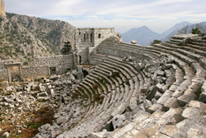
Ancient Greece
Liberal Democracy
Ancient Greece is credited with beginning democracy. The people of Athens, Greece, used the term demokratia to describe their form of government-demos means "the people" and kratia means "authority". Democracy is a form of liberal government in which representatives are elected by the citizens of a society to make decisions on their behalf.
Democracy is a system of government that allows people to choose their leaders in the hopes that those leaders will reflect their interests. These elected representatives give a voice to the people who elected them.-
People choose who will govern.
-
People can replace an unfavourable government.
-
People have the opportunity to voice their opinions about government.
When these conditions exist, a government represents the will of the people; that is, the government does what the citizens of a country want to happen. Liberal governments exist only when the will of the people is heard. That will can be heard best when the people choose who will govern at election time.
Democratic Limits on Government Power
What is important to people in separate societies differs according to time and the type of political system that exists. This helps explain why various political systems have arisen. What is important today may not be tomorrow, and what is important to one group may not be important to another.
At one time, political rights were the focus of attention, as seen in the American Revolution (1776), French Revolution (1789), and even the Russian Revolution (1917). People were seeking political rights:
-
the right to be involved in political decision-making
-
the right to be a part of making laws
-
the guarantee of individual rights and freedoms in a constitution
Recognizing the Will of the People
At the beginning of the American Revolution in 1776, representatives from the Thirteen Colonies wrote the American Declaration of Independence. It began with, "We the People..." reflecting the will of the people in the Thirteen Colonies to form their own country, the United States of America. The Declaration of Independence went on to state that all men were created equal and that they were given certain inalienable rights (cannot be taken away), such as life, liberty, and the pursuit of happiness.
Later, in 1789 in France, the Declaration of the Rights of Man and the Citizen pointed out the need to limit government powers by protecting liberty and property, by preventing arrest for no legitimate reason, and by limiting excessive taxation.
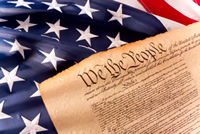
The American Constitution
Democracies constructed constitutions to guarantee certain rights and protect people from oppressive government. In effect, this means that government in a democracy becomes an agent for the people. As a result, government is by the people.
This means that people have the ultimate power because they choose, remove, or keep politicians in political office. This makes elected politicians answerable to the people who have elected them. If the majority of people do not like what has occurred, they can, at the next election, vote for someone else.
Of course, a majority of the people have to vote for change for this to occur. That is why the act of voting is so important for all eligible persons. Competition for power keeps politics free and open, and it helps to keep a democratic government from becoming a dictatorship.
The Practices of Democracy that Reflect Values of Liberalism
The key values of individualism and liberalism are emphasized in the following diagram along with the practices that reflect individual rights and freedoms:
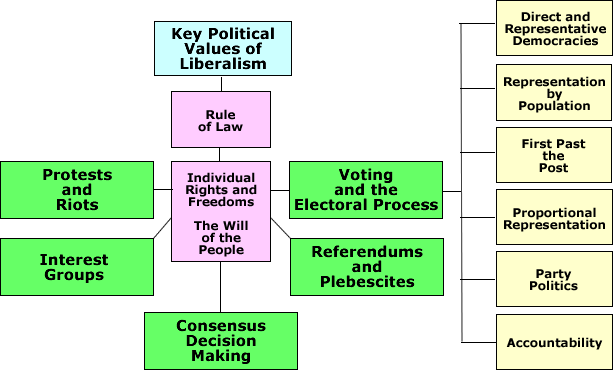
Proportional Representation
In the First-Past-the-Post section, some would argue that an election where the candidate with the most votes wins does not represent truly the will of the people. Some liberal democracies such as Sweden, Germany, Brazil, and others have chosen proportional representation as their electoral process.
In proportional representation, generally citizens do not vote for a person to represent them, but rather, they vote for a political party. Usually, citizens can choose from several political parties. Each citizen votes for the party he or she feels represents their beliefs and values best. The number of votes a party obtains will determine the number of people that party can put in government. That number of people is a percentage of the total number votes cast in the election.
For example, if in an election there are four political parties to choose from and 100 voters, the results could be as follows:
Party 1 got 45 votes or 45% of the total votes
Party 2 got 25 votes or 25% of the total votes
Party 3 got 15 votes or 15% of the total votes
Party 4 got 15 votes or 15% of the total votes
Each of the parties puts some of its people into the government. However, because Party 1 got a larger percentage of the votes, Party 1 gets to have more people in government than any of the other parties. This is balanced out somewhat because Parties 2, 3, and 4 together have more people in government than Party 1 does. So, Party 1 will not always get its way.
A good point about proportional representation: People from various political parties are in the government, which represents a better cross section of the will of the people. Always deals must be worked out between the parties because no one party can dominate the government - unless one party received well over 50% of the votes.
A bad point about proportional representation: This system can be quite complicated. Decisions may take quite some time until deals are worked out among parties. If a deal cannot be determined, then the government becomes ineffective.
Please watch this brief video which explains the difference between a first-past-the-post electoral system and proportional representation


Refer to pages 284-286
After concluding the lesson and watching the video: What do you think?
Is proportional representation more indicative of the will of the people than the first-past-the-post system?
Still need a bit more of an explanation?
Go to your textbook, Understandings of Ideologies, and read Proportional Representation on page 284-286. These pages will further your understanding of the concept of liberal democracy.
You should make notes, either on paper or on your computer, about what you have read.
3. Lesson 5.2.2 Disregarding the Will of the People
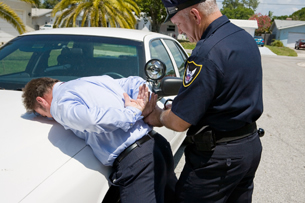
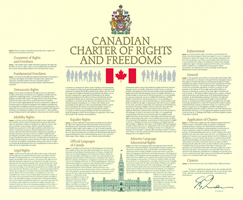
Canadian Charter of Rights and Freedom
Why Do Liberal Democracies Sometimes Disregard the Will of the People?
Have you ever imagined living in a country where there are no police or laws? In a land of total freedom, you could drive a stolen car at high speeds, assault anyone at anytime, and buy beer at age 12 or younger! What about taking money from others or swimming in your neighbour's pool? In a truly liberal society, you would be free to do as you please-and so would everyone else. Is that all you want?
You might still want the police to protect you and your property if you were being abused or taken advantage of. Do you like the government making laws that protect you from wrong and harm? Most people desire to be free. Government leaders understand this need, but they also recognize the necessity for protection and support for their citizens. One of the greatest challenges to liberal ideology is determining how to balance freedom and control.
Democratic governments must protect fundamental rights given to the citizens of their countries in constitutional documents similar to the Canadian Charter of Rights and Freedoms. Governments have the responsibility to ensure that laws respect the will of the people and the rights and freedoms guaranteed to them in their constitutions.
Click this link to see how the Charter protects the rights and freedoms and will of the Canadian people: Canadian Charter of Rights and FreedomsHowever, governments may need to suspend or limit rights and freedoms when world ideologies are in conflict and there is a real and present danger to the citizens.
Governments are faced with answering the following question: What are the best actions the government can take to protect its citizens?
To answer this question, the government must consider how citizens will react to the suspension of their rights and freedoms. Citizens and the government must determine under what conditions the government can limit the rights and freedoms of individuals.
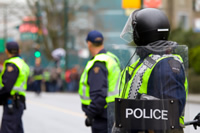
Sometimes, leaders in a liberal democracy feel they must reject liberal values if a situation threatens the safety and security of citizens. At times, the government may go so far as to suspend all democratic rights. Canadian Prime Minister Trudeau did that during the FLQ Crisis of October 1970. Since the terrorism attacks of 9/11, Canada and the United States have adopted new legislation to protect the citizens of their countries. These new acts have questioned the suspension of many civil liberties as well as the justification for using the broad powers given by the legislators to the government.
Did you ever wonder why airports have such tight security? Customs agents can detain a person if they suspect the person has materials or devices that might lead to a terrorist attack. A person's rights are suspended as soon as the person is confirmed as a suspect. The Canadian Charter of Rights and Freedoms protects citizens' rights, but there is also legislation that controls the actions of citizens and takes away their freedom if they are seen as a threat to security. You may wonder what events led to this legislation.
Before the Charter was enacted, Canada experienced a serious crisis in October 1970 in Québec. The Prime Minister at the time, Pierre Trudeau, chose to reject liberal democratic values temporarily so that the government of Canada could maintain security. In recent years, the United States has also been criticized for actions it took to maintain security after the terrorist attacks of September 11, 2001.
Sometimes, liberal governments must reject the very values they stand for to restore order and keep the peace. Sometimes the methods that liberal governments use to restore order work, and sometimes individual citizens lose their rights and freedoms unfairly.
4. Lesson 5.2.3 Case Studies: Disregarding the Will of the People
Here are some examples of when liberal democracies have disregarded the will of the people:
Quebec 1970
| |
PATRIOT Act in the United States
The PATRIOT (Providing Appropriate Tools Required to Intercept and Obstruct Terrorism) Act was enacted in 2001 in response to the terrorist attacks of September 11, 2001. This act allowed the United States government to take actions that reject liberal values. The United States PATRIOT Act gives the government, the CIA, the FBI, the police, and the newly formed Department of Homeland Security sweeping powers of surveillance, arrest, detainment, and search in the name of national security. If government officials believe an individual is involved in terrorist activities, the officials are allowed to tap phones and read personal e-mails and records of health and financial information.
Throughout the United States, citizens have criticized the PATRIOT Act. They believe that the PATRIOT Act denies citizens the basic freedoms that the American people are guaranteed through their Constitution and Bill of Rights. This act has been criticized for contradicting the Bill of Rights because individuals are being detained, questioned, and held in custody without recognition of their rights. The defenders of the act point out that this suspension of rights is being done only to provide safety, security, and maintenance of order in society.US Prison at Guantanamo Bay, Cuba
The PATRIOT Act is an example of how a government's actions can reject liberal values.
In the 1950s, the American government leased land in Cuba from the Cuban government. Since 1987, the United States has operated a prison in Guantanamo Bay on the southern edge of Cuba. After 9/11 and the beginning of the US war on Iraq, American officials sent as many as 775 detainees to Guantanamo Bay. Approximately 420 were released without charge. As of January 2009, there remained 245 detainees. The stories of individuals held in Guantanamo Bay provide examples for you to consider how a government might act in ways that are a rejection of liberal values.
Ibrahim Aziz, an immigrant to the United States from Iran in 1995, became an American citizen working as a photographer in Portland, Oregon. In 2005, he traveled to Iran to see his family. As he passed through American customs, he was arrested. No one told him why, no one read him his rights, and no one gave him the opportunity to communicate with his family or the outside world. He was turned over to agents of the Department of Homeland Security who took him to the Guantanamo Bay prison. There, he was detained and allegedly tortured until President Barack Obama ordered his release. These actions were taken under the PATRIOT Act.The Anti-Terrorism Act (2001) in Canada
The Anti-Terrorism Act (ATA) was enacted after the terrorist attacks on September 11, 2001. To protect itself and others, Canada had to develop an anti-terrorism strategy. The goal of the Anti-Terrorism Act is to give powers to the Canadian government to arrest terrorists and terrorist groups and to manage the extraordinary challenges presented by terrorism. The Anti-Terrorism Act aims to protect the safety, security, and fundamental rights of Canadians.
If you are suspected of terrorism, your phone could be tapped, your e-mail and Internet activities monitored, and your confidential information accessed by government officials. In addition, you could be arrested. Many people believe these powers contradict the Canadian Charter of Rights and Freedoms. Government officials maintain these powers are necessary to keep order and to maintain security for Canadians and the free world.
The Anti-terrorism Act
provides the powers to discourage terrorist organizations from setting up in Canada
provides the tools that the police and national securities agencies need to identify and find terrorists
provides tougher criminal sentences for terrorism offences
makes it a crime knowingly to participate in, facilitate, or contribute to a terrorist group
makes it a crime knowingly to collect or give funds to carry out terrorist acts
within carefully defined limits, allows for the arrest and detention of, and imposition of conditions of release on, suspected terrorists to prevent terrorist acts and save lives
helps Canada achieve its international obligations in the war against terrorism
ensures that Canadian values of respect and fairness are preserved through laws against hate crimes and propaganda
Canadians as Suspected Terrorists
A similar situation to Ibrahim Aziz under the PATRIOT Act in the U.S. also happened to Maher Arar, a Canadian citizen. Maher Arar was born in Syria and moved to Canada in 1987. He worked in Ottawa as a telecommunications engineer. In September 2002, he went on vacation to Tunisia. On a stop in New York City during his return to Canada, US officials detained him. The officials claimed he had links to the terrorist organization al Qaeda. Instead of allowing him to go back to Canada, the officials deported him to Syria although he had a Canadian passport.
After Arar was released and returned to Canada, he said he had been tortured when he was in Syria. He accused American officials of sending him to Syria although they knew that the Syrians use torture as a form of interrogation. Since his release, Arar has spoken out against abuses of human rights, and he is seeking compensation for his mistreatment.
On June 2, 2009, 400 police officers raided homes in Toronto and Mississauga, Ontario. On June 3, 2009, the police identified 17 people charged under the Anti-Terrorism Act with following a violent ideology inspired by al Qaeda. Twelve adults and five youths were arrested. The suspects were accused of plotting to blow up various sites in London, Ontario, and of plotting to storm Parliament Hill, to behead politicians, and to bomb nuclear plants and the RCMP headquarters in Ottawa. Many of the people arrested were released on bail. One of the detainees was denied bail. He was charged with receiving training from a terrorist group and with intending to cause an explosion likely to harm people or damage property. The police were able to identify the suspects by using wiretapping and testimony from witnesses.
Coronavirus
Coronaviruses are a large family of viruses. Some cause respiratory illness in people, ranging from mild common colds to severe illnesses.
Novel coronaviruses, like COVID-19, are new strains of the virus that have not been previously identified in humans. This means people have no immunity against it, and it has no specific vaccine or treatment.
COVID-19 vs. Flu
In some ways, COVID-19 is similar to influenza (also known as the flu), but there are also key differences.
Similarities
- Both cause respiratory disease
- Both are spread by small droplets from the nose and mouth
- Both are not spread through the air over long distances and times, unlike the measles
Differences
- COVID-19 does not appear to transmit as efficiently as influenza:
- only people with symptoms seem to be spreading the disease
- controlling its spread is possible when people with symptoms are isolated
- There is no specific vaccine or treatment for COVID-19.
- COVID-19 causes severe disease and mortality in more cases than the flu. On average:
- COVID-19 has resulted in 1 to 2 deaths per 100 cases
- Flu results in 1 death in every 1,000 flu cases
Timeline of Events:
According to the World Health Organization (WHO):
- A pneumonia of unknown cause detected in Wuhan, China was first reported to the WHO Country Office in China on 31 December 2019.
- The outbreak was declared a Public Health Emergency of International Concern on 30 January 2020.
- By March 11, 2020 WHO declared COVID 19 a pandemic, as the disease moved from rapidly spreading in one region (Hubei China) before making its way around the world in a matter of months.
Read about some of these examples:
- Canadians evacuated from China due to coronavirus to be quarantined at Canadian forces base
- Italy extends travel restrictions to entire country to try and contain spread of COVID 19
- China may be beating the coronavirus, at a painful cost
- Canada soccer announces suspension of all sanctioned soccer as precaution against COVID 19
- COVID 19- Educational Disruption and Response
These restrictive measures have been taken because, according to Alberta Health Services, "COVID-19 can cause serious illness, it is critical to keep it from spreading by having people with a symptoms stay home, away from others."
5. Conclusion
Liberal democracies walk a fine line between achieving the will of the people and rejecting liberal values to protect society against threats like terrorism. By contrast, authoritarian governments typically do not bother with the will of the people or individual rights and freedoms. Authoritarian political systems are more concerned with obedience to those in power and their ideology.
Remember which way power flows in an authoritarian political system compared to liberal democratic systems. Examine the diagram below:
